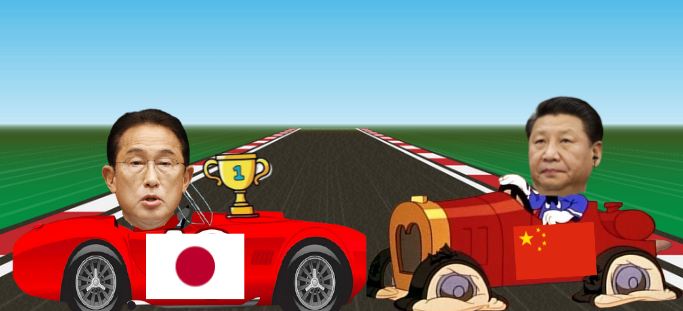China’s electric vehicle industry is plagued. China is offering electric vehicles as cheap as $4,500 around the world. Yet, China’s EV sector is existing under intense stress. So, Japan has decided to deliver a knockout punch to China, by rolling out a series of electric minicars, which are affordable and of supreme quality when compared to China’s substandard electric cars.
Suzuki Motor is eyeing a domestic rollout of an electric minicar by 2025 in a price range starting at 1 million yen, which is roughly $8,700. Nissan Motor and Mitsubishi Motors plan a spring 2022 domestic release of an EV costing around 2 million yen – on a par with a gasoline vehicle.
Nikkei Asia quoted Suzuki Motor President, Toshihiro Suzuki as saying, “If you’re offering a product to a kei car [minicar] customer, it’s essential to come within the 1-million-yen range. We aim to somehow introduce it by 2025.” On the question of Chinese electric vehicles dominating the markets, Suzuki said, “Based on the reliability of the batteries and other factors, I don’t think they will be drivable in Japan as they are now.”
Mitsubishi recently introduced the new all-electric Airtrek at the Auto Guangzhou in China. Takao Kato, president and chief executive officer, Mitsubishi Motors Corporation (MMC) said, “We hope the all-new Airtrek will help expand the horizons of customers in China, where environmental initiatives are accelerating with new energy vehicles, especially EVs.”
So, Japanese carmakers are effectively taking the fight to China, with the aim of taking on Chinese electric vehicle manufacturers. Nissan has gone a step ahead and is launching electric SUVs to pose a formidable challenge to China. Nissan is set to launch the Ariya, an electric SUV first announced in 2020 that the automaker hopes will help it recapture the EV stage after its initial success with the electric Nissan Leaf.
What Plagues China’s EV Industry
Many things are wrong with China’s electric vehicle industry. Lack of talent, the energy crisis in China, debt-ridden companies and a general business-hostile environment are among the main causes for China’s EV industry going bust. Chinese EV startups like the New York-listed Chinese upstart Nio Inc. have not been profitable since their inception. On top of China’s EV woes, the power outages in China are destroying its capability and infrastructure to maintain a huge Electric Vehicle industry.
And then, despite the ridiculous amount of cash that is pumped into China’s EV sector, major companies fail to take off. Evergande Group had made it to the news last year over an unsuccessful Electric Vehicle venture. In April, Bloomberg reported that China Evergrande New Energy Vehicle Group Ltd., an Electric Vehicle startup set up by the real estate major worth $87 billion greater than Ford Motor Co. and General Motors Co. failed to sell even one automobile.
Read more: China’s Electric Vehicle sector goes completely bust
Like China’s automobile industry, its EV industry survives on plagiarism. Chinese companies steal electric vehicle designs from the likes of Tesla and other global manufacturers, only to be snubbed by the Chinese people.
Japanese carmakers are upping the ante with China in mind. They are all set to roll out affordable electric vehicles so as to challenge China’s already exhausted EV industry. Also, German automobile majors like BMW AG, Volkswagen AG and Mercedes-Benz AG-owner Daimler AG have started to scale up their own operations in the Electric Vehicle industry. All in all, China is headed for a tough phase as far as electric vehicles of its own making are concerned.
Also Read: Superstitions and Irish Nose
